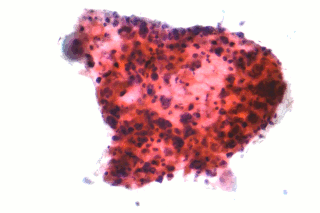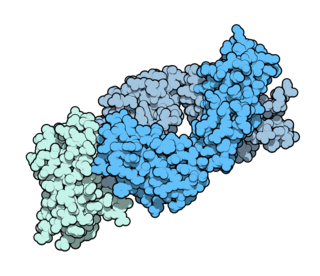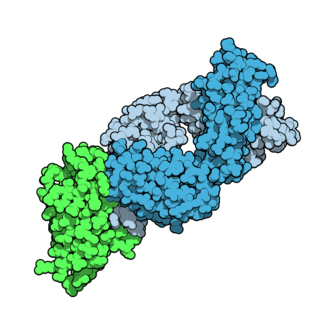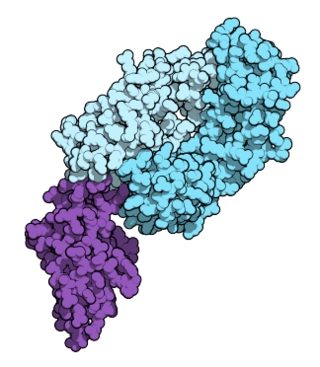Related Research Articles

Pemetrexed, sold under the brand name Alimta among others, is a chemotherapy medication for the treatment of pleural mesothelioma and non-small cell lung cancer (NSCLC)..
Bevacizumab, sold under the brand name Avastin among others, is a monoclonal antibody medication used to treat a number of types of cancers and a specific eye disease. For cancer, it is given by slow injection into a vein (intravenous) and used for colon cancer, lung cancer, ovarian cancer, glioblastoma, and renal-cell carcinoma. In many of these diseases it is used as a first-line therapy. For age-related macular degeneration it is given by injection into the eye (intravitreal).

Targeted therapy or molecularly targeted therapy is one of the major modalities of medical treatment (pharmacotherapy) for cancer, others being hormonal therapy and cytotoxic chemotherapy. As a form of molecular medicine, targeted therapy blocks the growth of cancer cells by interfering with specific targeted molecules needed for carcinogenesis and tumor growth, rather than by simply interfering with all rapidly dividing cells. Because most agents for targeted therapy are biopharmaceuticals, the term biologic therapy is sometimes synonymous with targeted therapy when used in the context of cancer therapy. However, the modalities can be combined; antibody-drug conjugates combine biologic and cytotoxic mechanisms into one targeted therapy.

Regeneron Pharmaceuticals, Inc. is an American biotechnology company headquartered in Westchester County, New York. The company was founded in 1988. Originally focused on neurotrophic factors and their regenerative capabilities, giving rise to its name, the company then branched out into the study of both cytokine and tyrosine kinase receptors, which gave rise to their first product, which is a VEGF-trap.

Non-small-cell lung cancer (NSCLC), or non-small-cell lung carcinoma, is any type of epithelial lung cancer other than small-cell lung cancer (SCLC). NSCLC accounts for about 85% of all lung cancers. As a class, NSCLCs are relatively insensitive to chemotherapy, compared to small-cell carcinoma. When possible, they are primarily treated by surgical resection with curative intent, although chemotherapy has been used increasingly both preoperatively and postoperatively.

Ipilimumab, sold under the brand name Yervoy, is a monoclonal antibody medication that works to activate the immune system by targeting CTLA-4, a protein receptor that downregulates the immune system.

Tremelimumab, sold under the brand name Imjudo, is a fully human monoclonal antibody used for the treatment of hepatocellular carcinoma. Tremelimumab is designed to attach to and block CTLA-4, a protein that controls the activity of T cells, which are part of the immune system.
Treatment of lung cancer refers to the use of medical therapies, such as surgery, radiation, chemotherapy, immunotherapy, percutaneous ablation, and palliative care, alone or in combination, in an attempt to cure or lessen the adverse impact of malignant neoplasms originating in lung tissue.

Cabozantinib, sold under the brand names Cometriq and Cabometyx among others, is an anti-cancer medication used to treat medullary thyroid cancer, renal cell carcinoma, and hepatocellular carcinoma. It is a small molecule inhibitor of the tyrosine kinases c-Met and VEGFR2, and also inhibits AXL and RET. It was discovered and developed by Exelixis Inc.

Nivolumab, sold under the brand name Opdivo, is an anti-cancer medication used to treat a number of types of cancer. This includes melanoma, lung cancer, malignant pleural mesothelioma, renal cell carcinoma, Hodgkin lymphoma, head and neck cancer, urothelial carcinoma, colon cancer, esophageal squamous cell carcinoma, liver cancer, gastric cancer, and esophageal or gastroesophageal junction cancer. It is administered intravenously.

Pembrolizumab, sold under the brand name Keytruda, is a humanized antibody used in cancer immunotherapy that treats melanoma, lung cancer, head and neck cancer, Hodgkin lymphoma, stomach cancer, cervical cancer, and certain types of breast cancer. It is administered by slow intravenous injection.

Sonidegib (INN), sold under the brand name Odomzo, is a medication used to treat cancer.

Atezolizumab, sold under the brand name Tecentriq, is a monoclonal antibody medication used to treat urothelial carcinoma, non-small cell lung cancer (NSCLC), small cell lung cancer (SCLC), hepatocellular carcinoma and alveolar soft part sarcoma, but discontinued for use in triple-negative breast cancer (TNBC). It is a fully humanized, engineered monoclonal antibody of IgG1 isotype against the protein programmed cell death-ligand 1 (PD-L1).

Sacituzumab govitecan, sold under the brand name Trodelvy, is a Trop-2-directed antibody and topoisomerase inhibitor drug conjugate used for the treatment of metastatic triple-negative breast cancer and metastatic urothelial cancer.
Avelumab, sold under the brand name Bavencio, is a fully human monoclonal antibody medication for the treatment of Merkel cell carcinoma, urothelial carcinoma, and renal cell carcinoma.

PD-1 inhibitors and PD-L1 inhibitors are a group of checkpoint inhibitor anticancer drugs that block the activity of PD-1 and PDL1 immune checkpoint proteins present on the surface of cells. Immune checkpoint inhibitors are emerging as a front-line treatment for several types of cancer.

Erdafitinib, sold under the brand name Balversa, is an anti-cancer medication. It is a small molecule inhibitor of fibroblast growth factor receptor (FGFR) used for the treatment of cancer. FGFRs are a subset of tyrosine kinases which are unregulated in some tumors and influence tumor cell differentiation, proliferation, angiogenesis, and cell survival. Astex Pharmaceuticals discovered the drug and licensed it to Janssen Pharmaceuticals for further development.
Dostarlimab, sold under the brand name Jemperli, is a monoclonal antibody used as an anti-cancer medication for the treatment of endometrial cancer. Dostarlimab is a programmed death receptor-1 (PD-1)–blocking monoclonal antibody.

Sotorasib, sold under the brand names Lumakras and Lumykras, is an anti-cancer medication used to treat non-small-cell lung cancer. It targets a specific mutation, G12C, in the protein K-Ras encoded by gene KRAS which is responsible for various forms of cancer. Sotorasib is an inhibitor of the RAS GTPase family.
Pralsetinib, sold under the brand name Gavreto, is a medication approved for RET mutation-positive medullary thyroid cancer (MTC) and RET fusion-positive differentiated thyroid cancer (DTC) refractory to radioactive iodine (RAI) therapy. Pralsetinib is a tyrosine kinase inhibitor. It is taken by mouth.
References
- 1 2 "Libtayo Australian Prescription Medicine Decision Summary". Therapeutic Goods Administration (TGA). 29 July 2020. Archived from the original on 13 August 2020. Retrieved 16 August 2020.
- ↑ "AusPAR: Cemiplimab" (PDF). Therapeutic Goods Administration (TGA). 9 November 2020. Archived from the original (PDF) on 7 June 2021. Retrieved 6 June 2021.
- ↑ "TGA eBS - Product and Consumer Medicine Information Licence".
- ↑ "Cemiplimab Product information". Health Canada. 25 April 2012. Retrieved 29 May 2022.
- ↑ "Summary Basis of Decision (SBD) for Libtayo". Health Canada . 23 October 2014. Retrieved 29 May 2022.
- 1 2 3 "Libtayo- cemiplimab-rwlc injection". DailyMed. 25 June 2020. Retrieved 16 August 2020.
- 1 2 3 4 5 6 7 8 9 10 11 12 13 14 15 "FDA approves first treatment for advanced form of the second most common skin cancer". U.S. Food and Drug Administration. 28 September 2018. Retrieved 7 August 2020.
 This article incorporates text from this source, which is in the public domain .
This article incorporates text from this source, which is in the public domain . - 1 2 3 4 5 6 7 "Libtayo EPAR". European Medicines Agency (EMA). 24 April 2019. Retrieved 7 August 2020. Text was copied from this source which is © European Medicines Agency. Reproduction is authorized provided the source is acknowledged.
- ↑ Lee A, Duggan S, Deeks ED (June 2020). "Cemiplimab: A Review in Advanced Cutaneous Squamous Cell Carcinoma". Drugs. 80 (8): 813–819. doi:10.1007/s40265-020-01302-2. PMID 32306208. S2CID 215804809.
- ↑ New PD-1 Inhibitor OK'd for Cutaneous SCC - Sixth PD-1/PD-L1 checkpoint inhibitor approved by agency 2018
- ↑ "FDA approves cemiplimab-rwlc in combination with platinum-based chemotherapy for non-small cell lung cancer". U.S. Food and Drug Administration. 8 November 2022. Retrieved 20 December 2022.
 This article incorporates text from this source, which is in the public domain .
This article incorporates text from this source, which is in the public domain . - ↑ "Isatuximab in Combination With Cemiplimab in Relapsed/Refractory Multiple Myeloma (RRMM) Patients". ClinicalTrials.gov. 21 June 2017. Retrieved 7 August 2020.
- ↑ "History of Changes for Study: NCT03194867". ClinicalTrials.gov. 2 June 2020. Retrieved 7 August 2020.
- ↑ "A Study of REGN2810 and Ipilimumab in Patients With Lung Cancer". ClinicalTrials.gov. 12 February 2018. Retrieved 7 August 2020.
- ↑ "History of Changes for Study: NCT03430063". ClinicalTrials.gov. 13 April 2020. Retrieved 7 August 2020.
- ↑ Sanofi and Regeneron Halt Cervical Cancer Trial Early Due to Dazzling Results, Plan to Submit to Regulators Biospace Mar 15, 2021
- ↑ Regeneron Pharmaceuticals (11 March 2022). "An Open-Label, Randomized, Phase 3 Clinical Trial of REGN2810 Versus Investigator's Choice of Chemotherapy in Recurrent or Metastatic Cervical Carcinoma". Sanofi.
- ↑ "Libtayo: Pending EC decision - European Medicines Agency". European Medicines Agency. 2022-10-13. Retrieved 2022-10-13.
- ↑ Gross ND, Miller DM, Khushalani NI, Divi V, Ruiz ES, Lipson EJ, et al. (October 2022). "Neoadjuvant Cemiplimab for Stage II to IV Cutaneous Squamous-Cell Carcinoma". The New England Journal of Medicine. 387 (17): 1557–1568. doi:10.1056/NEJMoa2209813. PMC 9844515 . PMID 36094839.